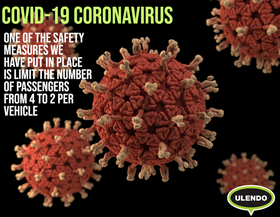Coronavirus disease (COVID-19) is an infectious disease caused by a newly discovered coronavirus.
Most people infected with the COVID-19 virus will experience mild to moderate respiratory illness and recover without requiring special treatment. Older people, and those with underlying medical problems like cardiovascular disease, diabetes, chronic respiratory disease, and cancer are more likely to develop serious illness.
Here are some facts you need to know about Coronavirus to keep yourself, your friends and your loved ones safe from the virus.
1. There is NO vaccine to cure COVID-19
Scientists have already begun working on a vaccine, but developing a vaccine that is safe and effective in human beings takes many months and even years to develop.
2. Taking antimalarial drugs like coartem WILL NOT protect you from getting the coronavirus
No antimalarial drugs or any other drugs will prevent you from getting the coronavirus disease or COVID-19.
3. You CANNOT protect yourself from COVID-19 by swallowing or gargling with bleach, taking acetic acid or steroids, or using essential oils, salt water, ethanol or other substances
None of these home remedies will protect you from getting COVID-19, and most of these practices can be dangerous. The best way to protect yourself from the coronavirus disease (and other viruses) includes
- Washing your hands frequently and thoroughly using soap and water or using an alcohol-based hand sanitizer
- Avoiding physical contact with people especially in public places. This is called social distancing
- Staying at home unless it is absolutely necessary to go out e.g. buying grocery at the local store while always following the rule of social distancing.
4. This is when you should wear a face mask:
- If you are healthy, you only need to wear a mask if you are taking care of a person with suspected 2019-nCoV infection.
- Wear a mask if you are coughing or sneezing.
- Masks are effective only when used in combination with frequent hand-cleaning with alcohol-based hand rub or soap and water.
- If you wear a mask, then you must know how to use it and dispose of it properly.
5. Kids and young people CAN be infected with the coronavirus
People of all ages can be infected by the new coronavirus (2019-nCoV). Older people, and people with pre-existing medical conditions (such as asthma, diabetes, heart disease) appear to be more vulnerable to becoming severely ill with the virus.
WHO advises people of all ages to take steps to protect themselves from the virus, for example by following good hand hygiene and good respiratory hygiene.
6. COVID-19 virus CAN BE transmitted in areas with hot and humid climates
From the evidence so far, the COVID-19 virus can be transmitted in ALL AREAS, including areas with hot and humid weather. Regardless of climate, adopt protective measures if you live in, or travel to an area reporting COVID-19.
There is no reason to believe that cold weather can kill the new coronavirus or other diseases. The normal human body temperature remains around 36.5°C to 37°C, regardless of the external temperature or weather.
7. Spraying alcohol or chlorine all over your body WILL NOT kill the new coronavirus?
Spraying alcohol or chlorine all over your body will not kill viruses that have already entered your body. Spraying such substances can be harmful to clothes or mucous membranes (i.e. eyes, mouth). Be aware that both alcohol and chlorine can be useful to disinfect surfaces, but they need to be used under appropriate recommendations.
8. Vaccines against pneumonia WILL NOT protect you against the new coronavirus?
Vaccines against pneumonia, such as pneumococcal vaccine and Haemophilus influenza type B (Hib) vaccine, do not provide protection against the new coronavirus.
The virus is so new and different that it needs its own vaccine. Researchers are trying to develop a vaccine against 2019-nCoV, and WHO is supporting their efforts.
Although these vaccines are not effective against 2019-nCoV, vaccination against respiratory illnesses is highly recommended to protect your health.
9. Eating garlic WILL NOT help prevent infection with the new coronavirus?
Garlic is a healthy food that may have some antimicrobial properties. However, there is no evidence from the current outbreak that eating garlic has protected people from the new coronavirus.
10. Are there any specific medicines to prevent or treat the new coronavirus?
To date, there is no specific medicine recommended to prevent or treat the new coronavirus (2019-nCoV).
However, those infected with the virus should receive appropriate care to relieve and treat symptoms, and those with severe illness should receive optimized supportive care. Some specific treatments are under investigation, and will be tested through clinical trials. WHO is helping to accelerate research and development efforts with a range or partners.
Source: www.who.int


Comment
3 comments Log in to commentchitaluisaac550@gmail.com
Noted.
1 month, 2 weeks Ago Report0 Reply
Moriah
Noted
1 year, 10 months Ago Report0 Reply